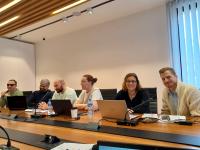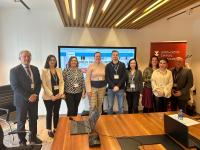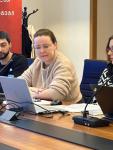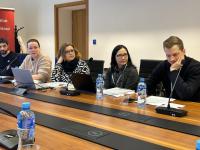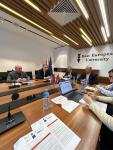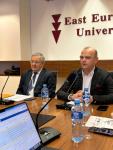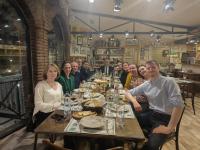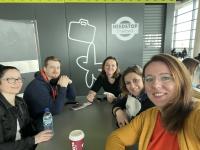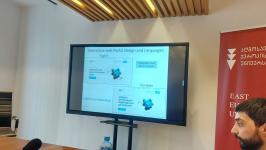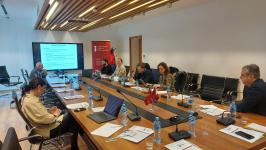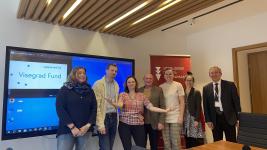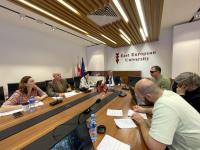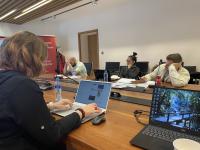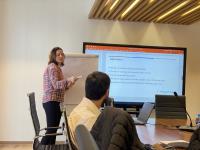A Conclusive Celebration: The Final Meeting of Visegrad Project No. 22210127 in Tbilisi
Tbilisi, [March 4. – 5., 2024] - The final meeting of the Visegrad Project No. 22210127, held in Tbilisi, marked a significant culmination of collaborative efforts among partners from the Czech Republic, Slovakia, Poland, Hungary, the East European University (EEU), and the Georgian Small and Medium Sized Enterprise Association (GSMEA). Over two days, participants gathered to reflect on the project's milestones, engage in insightful discussions, and set the groundwork for future collaborations.
Day 1: Reflections and Achievements
The meeting commenced with opening remarks from the lead project coordinator, setting a tone of gratitude and anticipation for the discussions ahead. A comprehensive overview followed, where partners presented their achievements, meticulously comparing them against the initial targets. A notable highlight was the EEU's presentation on its synergy with companies and the startup ecosystem, illustrating the project's far-reaching impacts.
Midday discussions pivoted towards the value-added by each partner, sharing success stories and extracting lessons from the project's journey. The afternoon was dedicated to a dissemination strategies workshop, focusing on how to share the project's outcomes with a broader audience through diverse media channels.
Day 2: Looking Forward
The second day fostered forward-thinking dialogues, beginning with a roundtable negotiations on Web Portal with IT Company Beflex and EEU. This session underscored the importance of ongoing monitoring and preparing documentation for the auditor's report. An excursion to a local university and laboratory offered a tangible glimpse into the project's academic and research implications, showcasing current projects and potential future ventures.
In the afternoon, participants had the opportunity to witness the practical applications of the project's outcomes and discussing collaborative successes. The meeting concluded with a faiwell ceremony, acknowledging the contributions of all participants and officially marking the project's conclusion.
A Celebratory Farewell
The event culminated in a farewell dinner, celebrating the successful completion of the project and the strengthening of partnerships. It was a moment of shared pride and optimism for future initiatives.
As the Visegrad Project No. 22210127 wraps up, its legacy of collaboration, innovation, and shared knowledge promises to inspire future endeavours, leaving an indelible mark on the participating countries and organizations.
Main results from Final meeting:
The following findings reflect a structured and strategic approach to developing a valuable digital resource for Georgia's startup and SME community, with a clear focus on sustainability, user engagement, and legal compliance. The document demonstrates a commitment to creating a platform that not only addresses immediate business challenges but also fosters long-term innovation and growth within the Georgian ecosystem.
The comprehensive overview of the progress and outcomes related to the development and sustainability of the Business Problems Interactive Web Portal. Here's a summary of the key findings:
- Startup Ecosystem in Georgia: The document provides a detailed mapping of the startup ecosystem in Georgia, highlighting the favourable business environment and notable platforms supporting startups and SMEs. It points out various resources and entities that contribute to the innovation landscape in Georgia, setting a contextual background for the web portal's relevance and potential impact.
- Business Problems Interactive Web Portal: The mission, vision, and main objectives of the web portal are clearly defined, focusing on supporting Georgian entrepreneurs, facilitating international market access, and promoting innovation-based business development. The portal aims to become a pivotal platform for networking, consulting, and fostering national and international partnerships.
- Assessment Indicators: A comprehensive list of assessment indicators is outlined to monitor the web platform's effectiveness. These indicators cover user engagement, technical performance, content relevance, user demographics, security, and impact metrics, ensuring a holistic approach to evaluating the platform's success and areas for improvement.
- Content and User Engagement: The document details the steps taken to identify the target audience, develop relevant content, and engage users effectively. This includes the use of a chatbot, mapping user personas, and creating a content strategy tailored to the needs and interests of the identified target groups.
- Logo and Trademark Considerations: A thorough analysis was conducted to ensure the uniqueness and protectability of the web portal's logo as a trademark. This included searching various databases to avoid conflicts with existing trademarks and ensuring the logo's distinctiveness and eligibility for protection.
- Sustainability Strategies: Various suggestions from project partners are provided to ensure the web portal's long-term sustainability. These include leveraging grants, fostering future collaborations, providing valuable services, and establishing a strong legal framework for intellectual property management and data security.
- Operational and Maintenance Responsibilities: The document identifies key personnel responsible for the web portal's content and maintenance, ensuring ongoing quality control and relevance to its users.
By addressing following multifaceted aspects, the document lays a solid foundation for the successful launch and sustained operation of the Business Problems Interactive Web Portal, ensuring it serves as a dynamic and impactful resource for Georgia's entrepreneurial and academic communities.
- Web Portal Design and Functionality: The document outlines the design process for the web portal, including initial visuals and feedback loops with project partners to refine the interface and user experience. This collaborative design process ensures the portal is intuitive, user-friendly, and aligned with the needs of its target audience.
- Content Development and Chatbot Integration: Special attention is given to the content development for the web portal, which includes a focus on digital marketing and the integration of a chatbot. This chatbot is designed to address key topics like corporate culture, agile marketing, and financial support for startups and SMEs, enhancing user interaction and providing valuable information efficiently.
- Stakeholder Engagement and Database Creation: The project emphasizes the importance of engaging various stakeholders, including SMEs, entrepreneurs, academics, and investors, to build a comprehensive database that supports targeted content delivery and interaction. This proactive approach in gathering and updating stakeholder information ensures the portal remains relevant and valuable to its users.
- Intellectual Property and Data Security: The document highlights the measures taken to protect intellectual property rights associated with the web portal, including the potential registration of the portal's logo as a trademark. Additionally, it addresses data security and privacy compliance, ensuring that the portal adheres to stringent standards to protect user information and maintain trust.
- Sustainability and Future Growth: The final output underscores various strategies to sustain the web portal post-project, such as identifying funding opportunities, continuing collaborative efforts among consortium members, and exploring services that the portal can offer to its users. These strategies are aimed at ensuring the portal's continued relevance, growth, and contribution to the startup ecosystem in Georgia and beyond.
- Compliance and Legal Framework: An overview of the legal and compliance considerations for operating the web portal is provided, ensuring that all aspects of user engagement, content delivery, and service offerings are conducted within the bounds of applicable laws and best practices. This includes adherence to intellectual property laws, data protection regulations, and other relevant legal frameworks.
- Evaluation and Continuous Improvement: The document advocates for regular audits and evaluations of the web portal to assess its performance, user engagement, and overall impact. These evaluations are crucial for identifying areas for improvement, enhancing user experience, and ensuring the portal's alignment with its mission and objectives.
